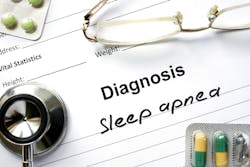The Federal Motor Carrier Safety Administration has extended to July 8 the comment period on its intent to develop a rule dealing with sleep apnea in truck drivers.
The extension comes at the request of the Owner-Operator Independent Drivers Assn. (OOIDA), based on new research regarding the costs and impacts of sleep apnea screening and treatment. The American Transportation Research Institute (ATRI) survey reports that drivers who had been referred to a sleep study paid an average of $1,220 in out-of-pocket expenses, representing just over 1.5 weeks of median driver pay at $805 per week.
OOIDA asked for the additional time for further review of the ATRI findings. Indeed, the survey averages do not reflect the much higher costs faced by some truck drivers, according to testimony provided by OOIDA Director of Regulatory Affairs Scott Grenerth in a formal FMCSA listening session in Chicago last month.
“We have members who have incurred out of pocket costs of $2,000, $6,000, $10,000 and $12,000 for testing and CPAP equipment combined. It is extremely rare that an insurance company cover the cost of any testing required by a Certified Medical Examiner,” Grenerth said in a submitted statement. “Especially when a CME is telling the driver that they will only accept a test from a very specific sleep lab and further, they will require a very specific CPAP device. There absolutely are vendors who provide testing and equipment at much lower cost, but drivers who are not allowed to seek a second opinion are stuck with using only one CME who holds their ability to earn a living in their hands.”
In that series of public listening sessions, FMCSA gathered the opinions of dozens of drivers, sleep specialists, and medical examiners.
“We want drivers to engage in the process and understand this isn't just a regulatory activity to put new burdens and responsibilities on them,” FMCSA Associate Administrator for Policy Larry Minor said in the concluding the final session. “But we're interested in their health and wellbeing, especially when they're in a safety sensitive capacity.”
Truckers who spoke typically expressed concern about the risk factors, the qualifications of the medical professionals making the determination, and the costs. More specifically, they questioned whether an examiner should be allowed to order a driver to have follow-up tests and treatment done by the company the examiner works for. They also cautioned FMCSA against setting hard and fast standards for a required sleep study, such as a Body Mass Index (BMI) threshold or neck size measurement.
To submit a comment online, go to www.regulations.gov.
About the Author
Kevin Jones 1
Editor
Kevin has served as editor-in-chief of Trailer/Body Builders magazine since 2017—just the third editor in the magazine’s 60 years. He is also editorial director for Endeavor Business Media’s Commercial Vehicle group, which includes FleetOwner, Bulk Transporter, Refrigerated Transporter, American Trucker, and Fleet Maintenance magazines and websites.
